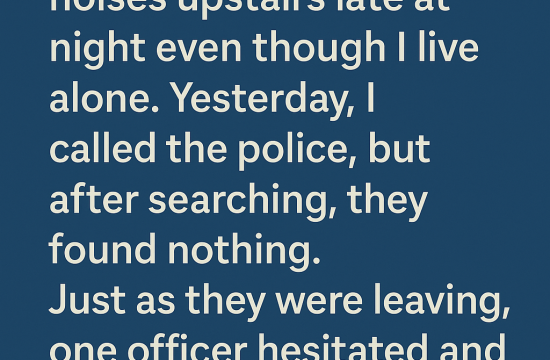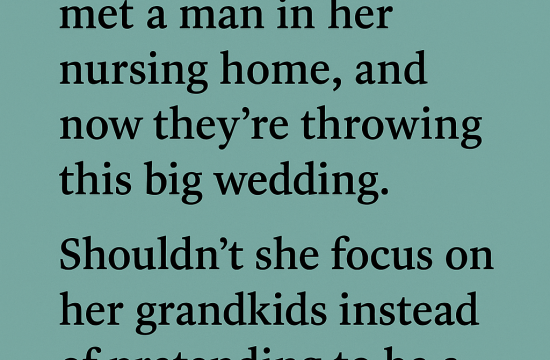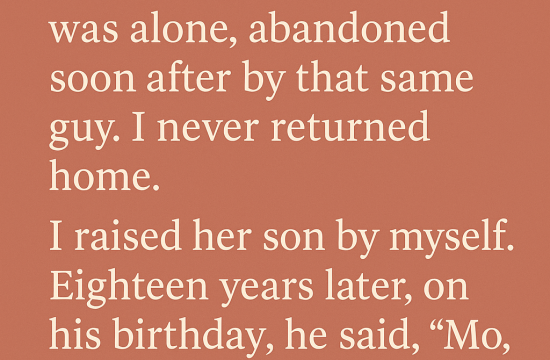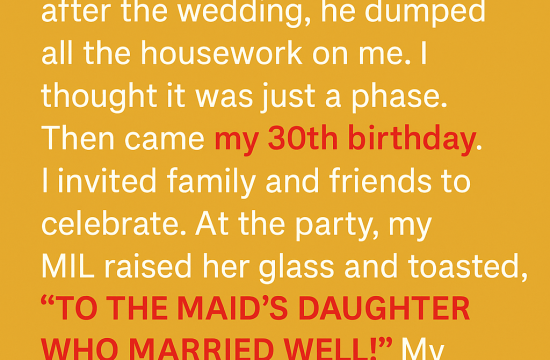“My wife has been unable to walk since childhood. Recently, we had a family dinner to celebrate my sister’s upcoming wedding. But what should’ve been a joyful evening turned sour fast. My sister pulled me aside and said she didn’t want my wife at the ceremony. ‘I want you by my side, not pushing a wheelchair around,’ she said. Then came the worst part: ‘Honestly, you should’ve married someone else. She’s a burden.’
I felt my blood boil. I stood up from the table and said, loud enough for everyone to hear: ‘My wife is not a burden. She’s the best thing that ever happened to me. If she’s not welcome, then neither am I.’
The room froze. My mother’s spoon clinked against her plate as she dropped it. My sister looked stunned, her face burning. She tried to explain, but I’d had enough. I helped my wife into her chair and walked out with her. Whispers followed us, but I didn’t care. My heart ached, but I knew one thing for sure: I’d never let anyone treat my wife like she was less than.
In the car, my wife sat silently, tears brimming. “I’m so sorry,” she said softly. I pulled over, turned to her, and held her hand. “Never apologize for who you are,” I told her. “You’re my partner. My love. If they can’t see your worth, that’s their loss.”
That night, we didn’t sleep. We sat in the living room, still dressed from the dinner, reliving the story of us—how we met, how we fell in love, how she laughed at my terrible jokes even before I had the courage to ask her out. It reminded us both that love doesn’t need approval to be real.
By morning, my phone was flooded with messages. My mom begged me to reconsider. Cousins told me they admired my stand. Even my sister texted, claiming she “didn’t mean it like that.” But she had. She called my wife a burden. That wasn’t stress. That was cruelty.
I ignored them for days. My wife coped by reading—escaping into stories when her own world felt too painful. I took time off work, and we created a small sanctuary for ourselves. We went to the park. To the movies. Around the block. Strangers waved, smiled. We felt safe. And seen.
Then, a week later, my mom showed up at our door. No warning—just red eyes and an apology. She hugged me and knelt beside my wife. “I’m so sorry,” she whispered, and my wife began to cry. It was the first crack of light after a week of darkness.
My mom said my sister wanted to apologize. I didn’t jump at the idea. I told her: my wife’s comfort mattered most. But to my surprise, my wife agreed to hear her out.
At a coffee shop days later, my sister sat trembling. When she saw my wife, she burst into tears. “I was wrong,” she said. “I was selfish. I let my fear of imperfection cloud what really mattered.” My wife listened. Then calmly said, “I forgive you. But never call anyone a burden again. You don’t know their strength.”
After that, my sister began including my wife in the wedding plans. She ensured the venue was fully accessible. She tried—not just in gestures but in time, in effort, in conversations. It didn’t erase the past, but it was a start.
Then something unexpected happened. My wife’s college friend Diana, a physical therapist, visited after seeing our story on social media. She offered to help. “There are new techniques—nerve stimulation, advanced therapy—things worth trying,” she said. My wife hesitated. She’d been let down before. But eventually, she said yes.
Twice a week, Diana came over. Progress was painfully slow. There were tears, even screams of frustration. But tiny wins appeared—a twitch, a shift, a less-stiff joint. I never missed a session. I held her hand when she wanted to quit and danced when she could flex her toes.
Then came a moment we’ll never forget.
My sister asked my wife to be a bridesmaid. A beautiful gesture. My wife cried when she heard. She picked a dress that would look radiant in a wheelchair. On shopping day, she laughed so freely, it reminded me of the woman I met years ago. The woman who changed my world.
The night before the wedding, I stayed up thinking. About that dinner. About how pain cracked something open. About how my wife’s grace and courage had transformed not just our marriage—but our whole family.
The morning of the wedding, our home buzzed with life. Makeup artists, laughter, nerves. My wife looked breathtaking in her lavender gown. Her eyes sparkled. I lifted her into her chair and whispered, “You ready?” She nodded, gripping my hand.
At the church, people turned to look as we entered. But for once, it didn’t feel like pity. It felt like respect.
Then, during the reception—another miracle.
While Diana helped stretch her legs, my wife gasped. “I can move it—look!” she cried. Her foot twitched forward more than ever before. We cried like children. It felt like the world was cracking open in the best way.
Weeks later, Diana referred us to a neurologist testing a new therapy. My wife qualified. One month in, she could stand for seconds with support. By the third, she could take steps with a walker.
I’ll never forget the morning I woke up to find her standing beside the bed, gripping the nightstand. She looked down at me, glowing, and whispered, “Look—I can do it.”
I jumped out of bed and caught her in my arms, shaking with tears. In that moment, everything changed.
Our family came together in a way we never thought possible. My mom became a daily visitor, cheering on every step. My sister helped with exercises. Even distant relatives began seeing my wife not as someone “in a chair”—but as someone extraordinary.
Eventually, she walked beside me in the park where we once rolled together. Strangers clapped. Some cried. And we held hands tighter than ever before.
That dinner? It was the worst night of our lives.
But maybe also… the beginning of everything.
Love isn’t about how easy the road is. It’s about who you choose to walk it with—even when walking feels impossible.
My wife still uses her chair for long trips, but now, every morning, she dances with me in our living room. And every time she takes a step, I’m reminded of the promise I made:
Not just to stay by her side—but to believe in her when no one else would.
If you believe in that kind of love, share this story. Someone out there needs to hear it.











